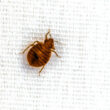Using orange peels to keep cats away is a common method homeowners use to protect their yards and gardens.
But is it actually effective?
This guide will teach you everything you need to know about using orange peels to repel cats. You might be surprised by how much there is to learn!
Table of Contents
Do Orange Peels Keep Cats Away?
Cats can be a real nuisance in your backyard. Whether it’s your cat going where you don’t want it or a stray from the neighborhood entering your domain uninvited, there are many reasons why you may seek ways to deter these creatures.
Felines have a knack for using garden plots as their personal litter boxes. It’s a mess you don’t want to encounter as you’re tending your plants. Not only that, but many cats will destroy delicate flowers, ornamental plants, and young trees.
You’ve likely heard of many different cat-repelling techniques. But one method that many homeowners are eager to try involves orange peels. Many people report that simple orange peels are enough to repel cats.
But is that true?
Believe it or not, orange peels do keep cats away most of the time. It’s not a foolproof technique, and your results can vary dramatically. Most cats show a strong aversion to oranges, but others can confront it without any issues.
It all depends on the cat you’re dealing with, and using this natural cat repellent will likely involve trial and error.
So, why do orange peels keep cats away? It comes down to the smell.
Orange has a distinct smell that cats can’t stand. But it’s not just oranges they hate. Any citrus has that distinctive aroma. That means lemon and lime peels work well, too.
The smell they dislike is most concentrated in the peels. If you have an orange around, do this quick experiment. Try taking one of the peels of a ripe orange and squeezing it between your fingers.
There’s a good chance that oils will squirt out into the air, leaving behind a powerful aroma. That’s what cats dislike, and you’ll notice that it doesn’t take much of that oil to create a lingering smell.
The reason why cats hate that odor so much is up for debate, but experts believe it has to do with survival instincts. The smell has a strong association with limonene, a compound found in citrus peels.
Limonene can be dangerous for cats, so some believe the mere smell is enough to keep them away. We’ll get into the details of safety later.
Advantages Of This Method
There are tons of reasons why keeping cats away with orange peels is worth trying. Compared to other methods, this one is pretty tame.
Orange peels are easy to source. If you’re a big fruit consumer, you probably discard peels regularly. Instead of tossing them out in the garbage or compost, you can use them to your advantage!
Another perk of using orange peels to deter cats is that they smell great for us humans. Cats might hate the stuff, but it’s quite pleasant for us. When you look at some of the grosser alternatives to orange peels, you’ll see why people love this method!
You must also think about the overall safety of using orange peels. Since oranges are fruits, they will decompose with time. If you use them in a garden plot, the fruit peels may even benefit your plants.
But one thing you don’t have to worry about is chemicals. Many chemical-based deterrents exist. While they might have great efficiency, there’s a tradeoff to using them.
Those products could cause physical and medical harm to cats. Furthermore, they can affect other innocent animals in negative ways.
The worst part is its effects on your backyard as a whole. No one wants to folic in chemical-laden grass. Using chemical products only puts children, pets, and yourself at risk.
When you use orange peels to keep cats away, you don’t have any of those worries. They’re perfectly safe to use and can provide impressive results.
How To Use Orange Peels To Keep Cats Away
Another big advantage of using orange peels to keep cats away is how easy it is! You don’t need much to use this method. But as always, there are some tips and tricks to maximize your results.
Follow these simple tips to use orange peels as an effective cat deterrent.
Source Your Citrus
Start by sourcing your citrus. Oranges are the most commonly used fruit for this technique, but it’s not the only one that works. As mentioned earlier, all citrus fruits have that signature smell that drives cats up the wall.
Oranges are cheap to source, but you can mix things up with lemons, limes, and other fruits.
The vital thing to do is use the peels only. The flesh won’t provide any meaningful impact. In fact, tossing ripe oranges and lemons around your yard may only attract ants and pests.
Peel the citrus, consume the fruit, and set the rinds aside.
Prepare The Peels
The next step is to prepare the orange peels. Don’t worry, you don’t need any special equipment or tools. A simple pair of kitchen scissors will do.
Cut the peels up into small, one-inch pieces.
The purpose of this step is to create a spreadable solution. You don’t want tons of large, uneven pieces. Getting perfectly uniform peels is unnecessary, but having everything roughly the same shape is always good. This step will help you spread the scent evenly throughout the treatment area.
Place Your Peels In The Soil
Here’s where you must be strategic.
One notable downside of using orange peels to keep cats away is that the smell doesn’t have a very far reach. The scent is strong but will not waft around the entire property.
As a result, you must be deliberate about where you put the peels.
The best approach is to focus on areas that you notice cats enjoy. For example, maybe you have a raised garden bed that cats enjoy using as a litter box. Or perhaps there’s a small plot that cats can’t stop destroying.
Those are the areas you want to focus on most.
Spread the orange peels around those problem spots. Apply the peels liberally to create as potent of a smell as possible.
Is It Safe To Use Orange Peels To Repel Cats?
Earlier, we mentioned that orange peels were a safer alternative to chemicals. That’s true from a human standpoint, orange peels can occasionally be problematic for cats.
Remember the limonene compound we talked about? If a cat ingests limonene, it can experience citrus poisoning. This condition can cause all kinds of trouble.
Most cats will suffer from pretty severe diarrhea and vomiting. It will also make felines drool uncontrollably and exhibit noticeable signs of weakness. In rare cases, it can also be fatal.
Fortunately, fatal cases are few and far between. But that doesn’t make citrus poisoning any less scary. Dogs can suffer from this condition, too. As a result, there are some inherent risks with using orange peels.
Now, most cats aren’t won’t eat the peels. They hate the stuff, after all. But some cats can get curious enough to taste.
If you’re worried about potentially harming your pet or a neighborhood cat, you can take steps to reduce the risks. The goal is to spread the smell. That’s what deters cats.
Some homeowners like to bury the orange peels in a thin layer of soil. That way, the smell lingers in the area while the peels are hidden out of sight.
Another option is to apply netting or use a mesh bag. Pop the peels in a tightly closed mesh bag, and the smell can radiate while remaining inaccessible to cats.
Conclusion
Orange peels keep cats away rather effectively, so we recommend giving it a try if you’re interested in natural forms of pest control.
If you have any questions about the information and tips in the guide above, feel free to ask us directly. Just send over a message or reach out to us on social media.


